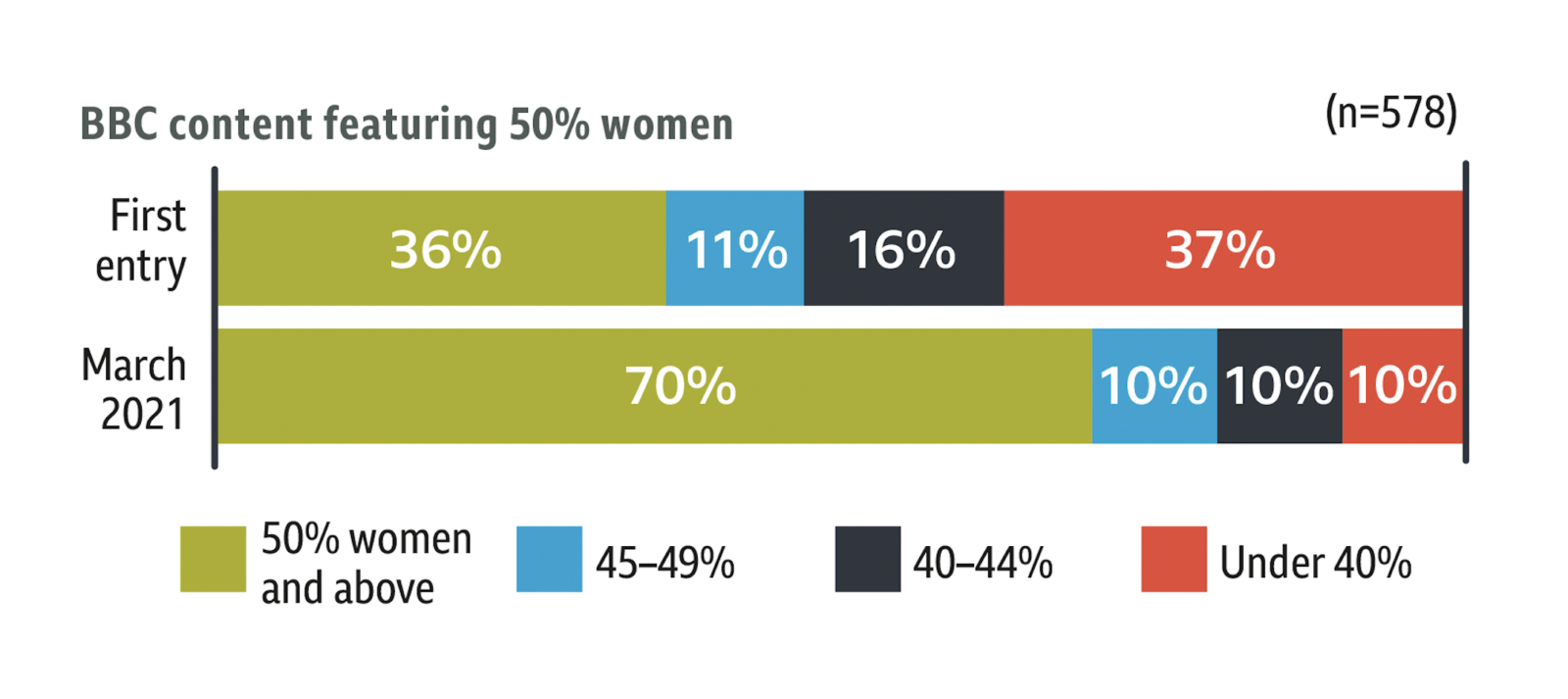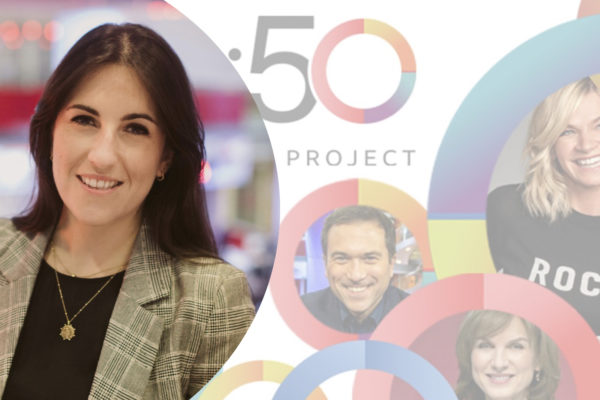BBC Creative Diversity Lead on the rise and rise of the 50:50 Project
Beginning with the single goal of improving gender representation on a specific news programme, the BBC 50:50 Project has developed significantly over the past four years. For its next challenge month – which takes place in March – the organisation will be joined in its gender balance tracking by 121 partner organisations across 26 countries, and is also expanding into areas around ethnicity and disability. We caught up with Lara Joannides, the BBC’s Creative Diversity Lead for News and 50:50, to find out more…
“50:50 really grew organically,” Joannides begins by telling us. “We say that it’s a grassroots initiative because it was born out of producers and content-makers doing this themselves, off their own backs, wanting to make this difference. And as more and more news teams started doing it, more and more people started to hear about it. Our then Director General Tony Hall said ok I really want to make this a firm part of our strategy at the BBC for representation. He came up with the idea of the 50:50 challenge month, and we’ve been doing that since April 2019.”
The organisation’s next challenge month in March 2022 will undoubtedly produce its biggest report into on-screen balance yet. Partner organisations across a wide range of industries will be taking part in the gender section of the challenge, while the BBC itself will for the first time be reporting on ethnicity and disability representation as well.
“It’s actually the second time we’ve had our partners report on their figures, but the first instance was in the middle of a global pandemic and was also just very new to all of the partners. So this year we want to make sure that everybody is taking part and up-to-speed… and we’re hoping for good results!”
Pioneering a more equal media world
A theme we’ve looked at with regards to BBC 50:50 before, is the influence that such a large, leading global organisation like the BBC can have on greater gender balance across the industry at large. In October the BBC announced that its international arm had achieved record reach, with 351 million people accessing its content around the world. So just how important is it that an organisation like the BBC gives a fair and accurate representation of the communities it reports on?
“Yeah that’s definitely important. Just looking at the BBC itself, as a public service broadcaster we have a duty and actually a responsibility within our charter to make sure that we’re representing all of the audiences of the UK population. This of course is not dependent on whether they are a kind of target customer or a client, which is what corporate media companies will be looking at. So for us it’s a duty that we have to do it.”

“But also I think its important for any organisation, whether they are a media company or any other organisation who creates media, because I think in this day and age every organisation creates content. Even if you’re in the energy sector or the education sector everyone has websites, everyone has social media channels – were all creating content and representing our companies and our brands to the wider world.”
“And so regardless of whether you’re a public service like the BBC or not, in terms of business needs it just means that you are going to be reaching out to a wider customer base and that more of those people will connect with what you’re doing and feel that they will want to come to you when they need the service that you’re offering.”
Action! Behind the camera as well as in front…
Of course, diversity and inclusion have – thankfully – become more important topics both for and in the media in recent years. As Reflect’s Nicola Murphy recently told us, this is just as important behind the camera as it is in front. In partnering with the Media Trust, the BBC has taken steps to ensure that it is not only accurately representing the society it reflects, but practicing what it preaches on the ground too.
“We partnered with the media trust charity last year,” says Joannides. “That was on a programme they had set-up called reframing disability in news. The focus was specifically to get more disabled experts to be given media training for news and then also to help BBC content makers find these experts and make sure that we are being as accessible as possible both in terms of how we set up the interviews and work with them, but also making the content accessible. We’ve now expanded that beyond news and opened up reframing to all divisions of the BBC.”
“We now also offer training within the BBC and have launched our own mentoring scheme as well. Because one of the things we’re finding is that particularly with production-based work, there are so many additional things that need to be taken into consideration to make sure that locations are accessible, and to make sure that the production works in a way that can suit any kind of requirement that people might need.”
“Our training aims to increase that knowledge, but also the number of people who identify as having a disability or a longterm condition to be coming into the industry and actually starting to get production jobs. That way they can then move higher up the chain and get into senior positions, because there is so much work going on at entry level as regards both women and those with disabilities, but actually then that kind of pathway into senior leadership positions need to be there too.”
Lara says that there has been a notable increase in interest from companies surrounding issues such as diversity and inclusion in recent years. Those putting people forward for interview for example know that media organisations and broadcasters are likely to be looking for a broad range of spokespeople. And despite the challenges that Covid has brought, engagement with BBC 50:50 has been high.

“It’s been a tough couple of years where there have been so many extra challenges thrown into the mix. Last March was our second ever challenge month and we went into lockdown in March, for the first time. Then this March just gone we were still in lockdown, so it has been a challenge to really keep teams focussed, especially when they can be so stretched.”
“We’re also still not at the same level in the non-challenge months and so we’re really working to try and make sure teams are doing this every day, every week, and not just in March. It’s encouraging that in this area we have slowly been increasing balance, so there are now beginning to be slow and steady improvements across the board.”
Women across roles, not just roles for women
And it’s important to remember that the 50:50 Project began life as a tangible means of tracking real progress in terms of balanced newsroom reporting. This is far from a box ticking exercise, and for Joannides, this slow and steady progress – and the idea of quality over quantity – remains key.
“I always liken it to a crash diet: you don’t just kind of want to go all in, overachieve in your first month, and then all the wind goes out of your sails and you struggle again to get back up there. We’d much rather teams do it incrementally and build up that foundation of having brilliant contributors who are different to the ones they’ve been used to using.”
“Understanding where your barriers are is also critical in this respect. So whether that’s stories you’re covering in a particular region, or in a particular subject area, it’s important to put the work in when you have the time to find those contributors in those specific areas.”
“We don’t want teams to fall back on stereotypes and think ok well we’re really struggling to get women to talk about finance, so were just going to get a woman on to talk about childcare. That’s the easy solution, but that’s not the solution we’d want. So we’d much rather they take a longer time to get there, but when they get there it’s really meaningful and its more about the quality of contributors rather than the quantity.”
Finally, with the next challenge month on the horizon, how can companies get involved directly in the next round of tracking?
“Yeah so if any of our existing partners aren’t aware of the 50:50 challenge, it’s open to anyone who’s already signed up. We’ll be going around all of them in Jan and Feb to get them geared up so that they can make sure they’re achieving 50% in March and then publishing their figures alongside that.”
“And then 50:50 is always looking for new partners so if anyone isn’t yet involved they can just come to our website and there’s a contact us form, or feel free to drop me an email. And were always happy to have a chat with those organisations to see how 50:50 might work for them.
For more information on The BBC 50:50 Project, including on how your organisation can get involved, click here.








